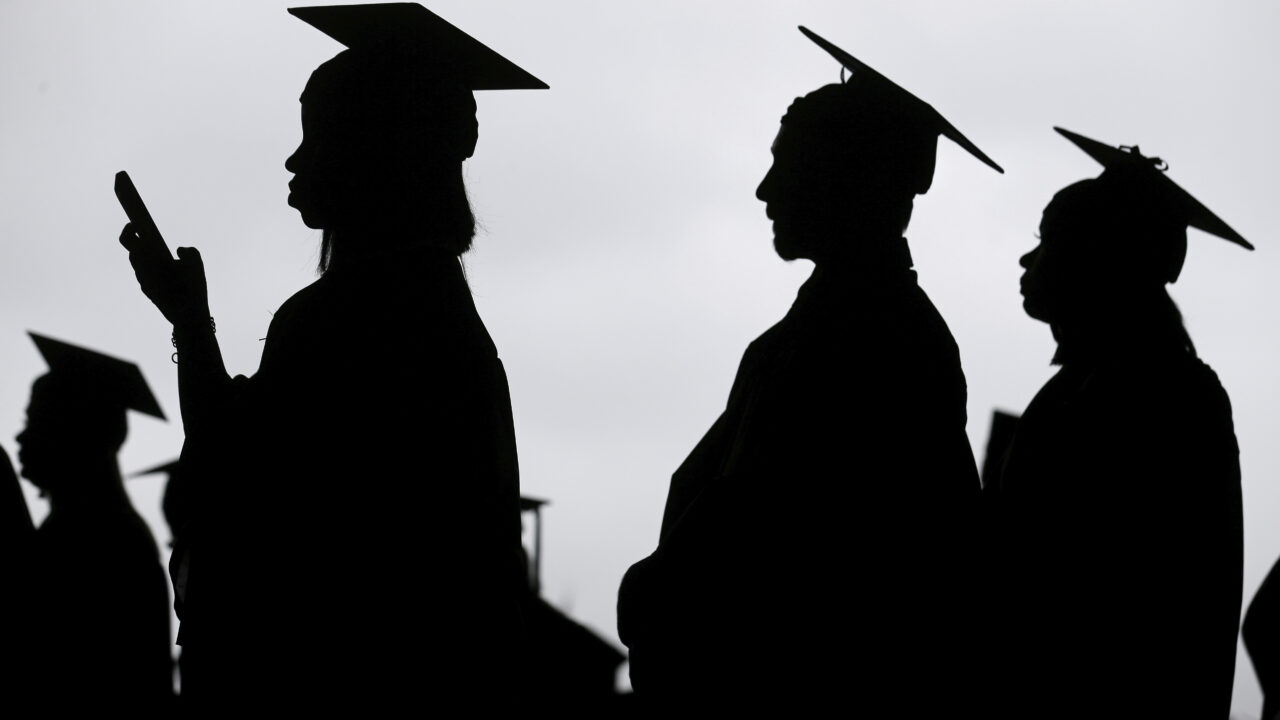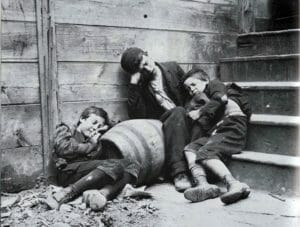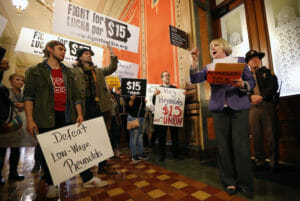Restart of Student Loan Payments Will Disproportionately Impact BIPOC
Some with outstanding loans say they plan to boycott the payments altogether. New graduates line up before the start of a community college commencement in East Rutherford, N.J., May 17, 2018. (AP Photo/Seth Wenig, File)
New graduates line up before the start of a community college commencement in East Rutherford, N.J., May 17, 2018. (AP Photo/Seth Wenig, File)
Student loan repayments are set to restart in October following a three-year pandemic hiatus. In June, the Supreme Court ruled against President Joe Biden’s plan to forgive up to $20,000 in federal student loans, leaving about 37 million people in debt or financially vulnerable. While the administration has promised to provide other debt forgiveness where possible, people of color who are in debt say the decision to restart payments will set them back even further and force them to make difficult financial decisions. Some say they plan to boycott the payments.
One option, the SAVE student loan repayment plan, will replace the plan formerly known as Revised Pay as You Earn and cap monthly payments at 5% of discretionary income; the current cap is 10%. This summer, the discretionary income threshold went up to 225% of the poverty line, or about $32,800 for individuals. Any borrower earning that salary or less could qualify for a $0 monthly payment on the SAVE plan. The plan also offers a faster track to loan forgiveness.
“What happens with a lot of these programs is [they are] application based … It keeps a substantial portion of the people that need the support the most from getting it,” said Maddy Clifford, the deputy press secretary for The Debt Collective, a debtors’ union. “People just don’t take into account some people are homeless or they don’t have access to these types of [technology].”
Clifford counts herself as one of the debtors who will be boycotting her continued loan payments.
“Student debt is inherently predatory,” Clifford said. “I don’t think people understand that, and it worsens all existing economic disparities across racial and gender lines.”
While the administration has promised to provide other debt forgiveness where possible, people of color who are in debt say the decision to restart payments will set them back even further and force them to make difficult financial decisions.
Clifford says she worries BIPOC in debt are going to choose between making their loan payments and paying rent, hospital bills, or even food. Clifford suggests there will be a mass default. From the end of 2019 to the end of 2021, the percentage of student loan borrowers whose balances stayed the same or increased by 7 percentage points, or roughly 3 million people.
According to a 2023 Education Data Initiative report, Black college graduates owe an average of $25,000 more in student loan debt than white college graduates. Four years after graduation, Black students owe an average of 188% more than what white students borrowed. Additionally, Black student borrowers are the most likely to struggle financially due to student loan debt making monthly payments of $250.
“What people don’t understand about defaulting is that people do it when they’re just overwhelmed with making payments,” said Clifford. “Defaulting only further penalizes people who can’t pay by ruining your credit … You fall into this web where now your wages are going to be garnished, so it’s going to be hard to pay your bills.”
As homelessness increased by 11% nationwide and food insecurity continues to grow, Black borrowers and Black women, who support 80% of Black households, are especially impacted. A 2021 mental health survey found that 1 in 14 borrowers experienced suicidal ideation because of the financial stress of student loans. For borrowers who were unemployed or making less than $50,000 per year, this rate jumped to 1 in 8.
“It’s a very confusing bureaucracy that people are having to navigate,” Clifford said.
Advocates like Clifford say the Biden administration has a “Swiss Army knife of legal options” they can use to help borrowers. The 1965 Higher Education Act, which establishes federal aid programs like grants and loans to help students pay for college, could be used by Biden now to cancel all student loan debt. Clifford also says BIden could declare a climate emergency to reinstate the pause on loan payments.
“It’s bleak, but I think sometimes it gets to such a bad point that people [say], ‘I’m not going to put up with this anymore,’” Clifford said. “It shows that people are getting to a point where they’re going to want to organize or fight back.”
Clifford suggests joining a union to work collectively with an action plan for borrowers who want to strike their student loan debt.
According to a 2023 Education Data Initiative report, Black college graduates owe an average of $25,000 more in student loan debt than white college graduates.
“All these people that are striking, they’re not just striking haphazardly. They have a union backing them, and they have a strategy of what they’re going to do and the demands that they’re making,” Clifford said. “It’s a fight, and we’re in this to win this.”
Looking into the 2024 presidential election, Clifford says Biden’s failed promises will weigh negatively on him. Biden’s plan includes a 12-month exemption for borrowers from the worst consequences of missed, late or partial payments. For borrowers with defaulted federal loans, a one-time temporary program, called Fresh Start, will provide special benefits and help them get out of default.
“He’s going to be known as debt collector in chief,” Clifford said. “We know that if he really takes bold and swift action, if he finishes the job as he likes to say, he would gain so much support from voters not only in his base, but also conservatives across the board. He would get a huge amount of support, and unfortunately, he’s just kind of been dragging his feet.”
According to a 2022 CNN poll, a plurality of voters who approve and disapprove of Biden found that he was doing too little to address student loan debts.
Melissa Santos, a student debtor, has been repaying her student loans for the past six years but entered a graduate study program to avoid having to repay her loans. Santos comes from a single-parent, low-income household and would not have been able to afford higher education without taking out loans. Currently, she owes about $93,000 in student loans for her undergraduate degree.
“It’s extremely challenging. I thought [canceling student loan debt] was a ray of light, to actually get some justice in terms of what we’ve had to sacrifice,” Santos said. “But you struggle with your self-worth, your mental health. Those are additional chains that people don’t talk about … People are human beings, people are struggling, and numbers are just what ends up on the paper.”
Your support matters…Independent journalism is under threat and overshadowed by heavily funded mainstream media.
You can help level the playing field. Become a member.
Your tax-deductible contribution keeps us digging beneath the headlines to give you thought-provoking, investigative reporting and analysis that unearths what's really happening- without compromise.
Give today to support our courageous, independent journalists.





You need to be a supporter to comment.
There are currently no responses to this article.
Be the first to respond.